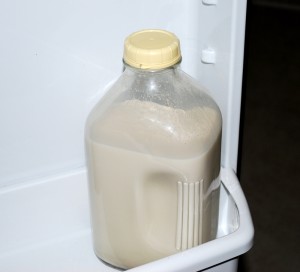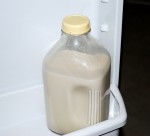by Pathways Magazine– ICPA.org:
Protective Components: Raw milk contains numerous components that assist in:
Killing pathogens in the milk (lactoperoxidase, lactoferrin, leukocytes, macrophages, neutrophils, antibodies, medium chain fatty acids, lysozyme, B12 binding protein, bifidus factor, beneficial bacteria);
Preventing pathogen absorption across the intestinal wall (polysaccharides, oligosaccharides, mucins, fibronectin, glycomacropeptides, bifidus factor, beneficial bacteria);
Strengthening the Immune System (lymphocytes, immunoglobulins, antibodies, hormones and growth factors).
Pasteurization Harmful: Many of these antimicrobial and immune-enhancing components are greatly reduced in effectiveness by pasteurization, and completely destroyed by ultra-pasteurization.
Dangers Exaggerated: Although raw milk, like any food, can become contaminated and cause illness, the dangers of raw milk are greatly exaggerated. In an analysis of reports on 70 outbreaks attributed to raw milk, we found many examples of reporting bias, errors and poor analysis resulting in most outbreaks having either no valid positive milk sample or no valid statistical association.
USDA/FDA Statistics: Based on data in a 2003 USDA/ FDA report: Compared to raw milk there are 515 times more illnesses from L-mono due to deli meats and 29 times more illness from L-mono due to pasteurized milk. On a per-serving basis, deli meats were 10 times more likely than raw milk to cause illness.
Outbreaks Due to Pasteurized Milk: Due to high volume distribution and its comparative lack of anti-microbial components, pasteurized milk when contaminated has caused numerous widespread and serious outbreaks of illness, including a 1984-5 outbreak afflicting almost 200,000 people. In 2007, three people died in Massachusetts from illness caused by contaminated pasteurized milk.
Ancient History: Claims that raw milk is unsafe are based on 40-year-old science and century-old experiences from distillery dairy “factory farms” in rapidly urbanizing 19th-century America.
Modern Advantages: Compared to 30–50 years ago, dairy farmers today can take advantage of many advancements that contribute to a dramatically safer product including pasture grazing, herd testing, effective cleaning systems, refrigeration and easier, significantly less expensive, more accessible and more sophisticated milk and herd disease-testing techniques.
Unique Food: Raw milk is the only food that has extensive built-in safety mechanisms and numerous components to create a healthy immune system.
The Oppression
The FDA has threatened enforcement and taken action against both farmers and buyer’s co-ops across the country for allegedly violating 1240.61 and 131.110(a). Below are a few recent examples. There was no allegation that the raw milk had caused any illnesses in any of these cases.
The FDA spent a year in an undercover sting operation on an Amish farmer, Dan Allgyer of Rainbow Acres in Pennsylvania. Agency employees lied about their identity and joined local buying clubs. They picked up raw milk from private residences—again, concealing their identities—and sent the milk to be tested. Despite nearly a dozen tests, not one sample showed any contamination. Despite the fact that this clean milk had not made anyone sick, the agency ultimately raided Allgyer’s farm in May 2011. In February 2012, the FDA obtained an injunction in federal court to prevent Allgyer from distributing raw milk across state lines in the future.
FDA officials, together with officials from five other local, state, and federal agencies raided the Rawesome Food Club, a private buying club in Venice, California, on June 30, 2010. Police accompanying the various agency officials entered the store with guns drawn. The officials confiscated 17 coolers of food, including raw milk and raw milk products, even though the warrant stated that they could only take samples. In 2011, the government raided Rawesome a second time on August 3, with FDA officials again participating in the raid. Government agents seized almost the entire food inventory at the store, dumping out all the raw milk on the premises without any court order to do so.
The store manager, a farmer supplying the store, and an administrator for the farmer who did nothing more than take orders and disseminate information, were each charged with multiple felonies alleging violations of state food and dairy laws.
An FDA agent participated in the dumping of more than 100 gallons of impounded raw milk belonging to members of a Georgia food buying club, which had been legally purchased from a licensed South Carolina dairy in October 2009. The primary agency in that action was the Georgia Department of Agriculture, but the FDA official present at that time told the buying club’s agent that even an individual consumer cannot legally cross state lines to buy raw milk and bring it home under 1240.61 and 131.110.
In all of these cases, there was no allegation that the raw milk had caused any illnesses or was contaminated in any way. It’s time to tell FDA to focus on real threats to public safety—the consolidated, industrialized food system—and to stop interfering with direct farmer-to consumer transactions.
